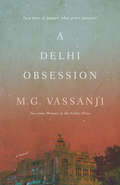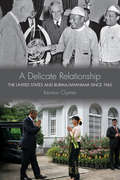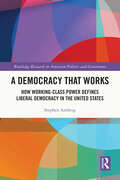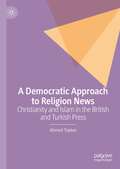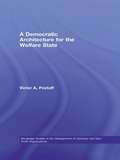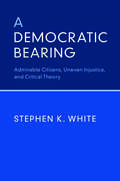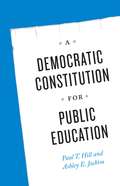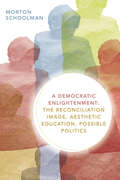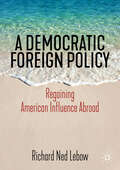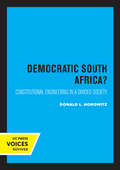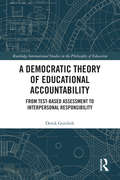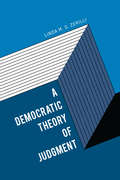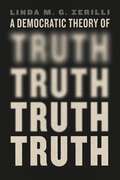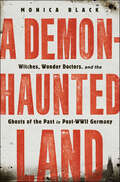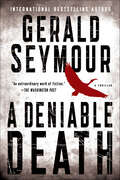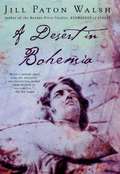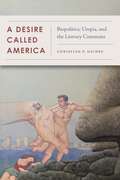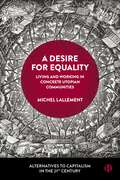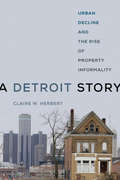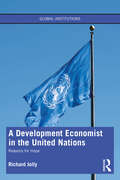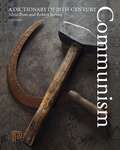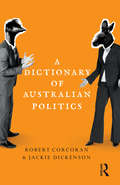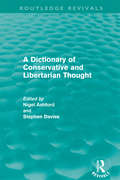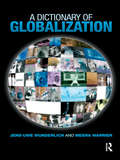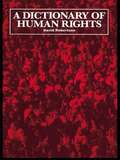- Table View
- List View
A Delhi Obsession: A Novel
by M.G. VassanjiTwo-time Giller Prize winner M.G. Vassanji returns with a powerful new novel about grief and second chances, tradition and rebellion, set in vibrant present-day Delhi.Munir Khan, a recent widower from Toronto, on a whim decides to visit Delhi, the city of his forbears. Born in Kenya, he has lost all family connections, and has never visited India before. While sitting in the bar of the Delhi Recreational Club where he's staying, an attractive woman joins his table to await her husband. A sparring match ensues. The two are from different worlds: Munir is a westernized agnostic of Muslim origin; Mohini, a modern Hindu woman. Utterly witty and charming, she's religiously traditional, but also a liberal and provocative newspaper columnist. Against her better judgment, Mohini agrees to show Munir around the city. As they explore the thriving markets and historical buildings of Old Delhi, an inexplicable attraction begins. What follows is a passionate love affair--uncontrollable yet impossible. This is a period of rising Indian nationalism in modern India that at times finds outlet in senseless violence. Constantly lurking at Munir's Club is the menacing and foreboding presence of a fanatical nationalist group. To them Munir Khan is simply a Muslim "love-jihadi" who has led the pride of Hindu womanhood, Mohini Singh, astray. At what cost, their passion?
A Delicate Relationship: The United States and Burma/Myanmar since 1945
by Kenton ClymerIn 2012, Barack Obama became the first U.S. president ever to visit Myanmar, formerly known as Burma. This official state visit marked a new period in the long and sinuous diplomatic relationship between the United States and Burma/Myanmar, which Kenton Clymer examines in A Delicate Relationship. From the challenges of decolonization and heightened nationalist activities that emerged in the wake of World War II to the Cold War concern with domino states to the rise of human rights policy in the 1980s and beyond, Clymer demonstrates how Burma/Myanmar has fit into the broad patterns of U.S. foreign policy and yet has never been fully integrated into diplomatic efforts in the region of Southeast Asia. When Burma, a British colony since the nineteenth century, achieved independence in 1948, the United States feared that the country might be the first Southeast Asian nation to fall to the communists, and it embarked on a series of efforts to prevent this. In 1962, General Ne Win, who toppled the government in a coup d'état, established an authoritarian socialist military junta that severely limited diplomatic contact and led to a period in which the primary American diplomatic concern became Burma's increasing opium production. Ne Win's rule ended (at least officially) in 1988, when the Burmese people revolted against the oppressive military government. Aung San Suu Kyi emerged as the charismatic leader of the opposition and was awarded the Nobel Peace Prize in 1991. Amid these great changes in policy and outlook, Burma/Myanmar remained fiercely nonaligned and, under Ne Win, isolationist. The limited diplomatic exchange that resulted meant that the state was often a frustrating puzzle to U.S. officials. Clymer explores attitudes toward Burma (later Myanmar), from anxious anticommunism during the Cold War to interventions to stop drug trafficking to debates in Congress, the White House, and the Department of State over how to respond to the emergence of the opposition movement in the late 1980s. The junta’s brutality, its refusal to relinquish power, and its imprisonment of opposition leaders resulted in public and Congressional pressure to try to change the regime. Indeed, Aung San Suu Kyi’s rise to prominence fueled the new foreign policy debate that was focused on human rights, and in that climate Burma/Myanmar held particularly large symbolic importance for U.S. policy makers. Congressional and public opinion favored sanctions, while U.S. presidents and their administrations were more cautious. Clymer’s account concludes with President Obama’s visits in 2012 and 2014, and visits to the United States by Aung San Suu Kyi and President Thein Sein, which marked the establishment of a new, warmer relationship with a relatively open Myanmar.
A Democracy That Works: How Working-Class Power Defines Liberal Democracy in the United States (Routledge Research in American Politics and Governance)
by Stephen AmbergA Democracy That Works argues that rather than corporate donations, Republican gerrymandering, and media manipulation, the conservative ascendancy reflects the changes in how work is governed that have disempowered workers. Using six historical case studies from the emergence of the New Deal, and its later overtaking by the conservative neoliberal agenda, to today's intersectional social justice movements, Stephen Amberg deploys situated institutional analysis to show how real actors created the rules that empowered liberal democracy for fifty years and then how Democrats and Republicans undermined democracy by changing those rules, thereby organizing working-class people out of American politics. He draws on multidisciplinary studies to argue that when employees are organized to participate at work, they are also organized to participate in politics. In doing so the book opens up analytical space to understand the unprecedented threat to liberal democracy in the United States. A Democracy That Works is a fresh account of the crisis of democracy that illuminates how historical choices about the role of workers in the polity shaped America's liberal democracy during the twentieth century. It will appeal to scholars of American Politics and American Political Development, Labor and Social Movements, Democracy, and comparative politics.
A Democratic Approach to Religion News: Christianity and Islam in the British and Turkish Press
by Ahmed TopkevThis book introduces the first systematic and unified four-dimension democratic approach to newspaper religion reporting. It explores the coverage of faith, with a particular focus on Christianity and Islam, in the British and Turkish national press. The results of framing analysis, conducted through content analysis of 1,022 news articles, reveal that, in both countries, alongside the contrasting portrayals of the minority religions, even the dominant religions had a disproportioned employment of the four dimensions – spiritual, world life, political, and conflict. It contributes to scholarship not only empirically but also theoretically and methodologically, with its theoretical and methodological contribution surpassing its empirical findings. As such, it will transcend geographical and temporal boundaries, making it appealing and relevant to an international audience of academics, professionals, and students in the fields of journalism, religion, democracy, media, communication, society, and culture, as well as individuals from various backgrounds.
A Democratic Architecture for the Welfare State (Routledge Studies in the Management of Voluntary and Non-Profit Organizations)
by Victor A. PestoffThe welfare state faces various challenges in Scandinavia and many European countries today, including a poor work environment in the public sector, a growing democracy deficit, and demographic obstacles. In this new book, Victor A. Pestoff argues that the state cannot resolve these challenges alone or together with the market, rather it requires the active participation of citizens and the third sector in order to overcome them and become more sustainable and flexible in the future. This book addresses the need for a more democratic architecture for the European welfare state, opening new perspectives for developing alternative channels for direct citizen participation at the sub-municipal level of governance. Pestoff finds that neither democratic theory nor welfare state theory devotes adequate attention to the contemporary role of the third sector as a service provider or to greater direct citizen participation in the provision of welfare services. He shifts the focus of analysis from the input to the output side of the political system and explores new ways to promote a greater role for the third sector and more citizen participation in the provision of universal, tax financed welfare services. Part 1 discusses social economy actors in Sweden and Scandinavia, both from a historical and future perspective. Part 2 explores major issues for the third sector and welfare state, including the allocation of an organization’s surplus or profit, work environment and service quality in public services and the third sector, consumer perspectives on the social economy, democratizing medical and health care in Japan, and co-production of childcare services in eight European countries. Part 3 revisits the third sector and state in democratic theory and welfare theory, as well as recognizing major hurdles to the third sector and democratization of the welfare state. Part 4 concludes by summarizing the politics of participation in the welfare state.
A Democratic Bearing
by White Stephen K.In this rich analysis of the changing ideals of citizenship, Stephen K. White offers a path for the renewal of democratic life in the twenty-first century. Looking beyond passive notions of citizenship defined in terms of voting or passport possession, White seeks a more aspirational portrait, both participatory and inclusive, that challenges citizens, especially in the middle class, to confront power structures to achieve greater justice. Using the Tea Party and followers of Donald Trump as foils, he shows how these groups' resentful and exclusivist conceptions of active citizenship undermine democratic aspirations. White explores how such deleterious influence might be effectively engaged by a robust counter-conception on the democratic left. The book makes this aspirational ideal conceptually clear, normatively compelling and aesthetically attractive.
A Democratic Constitution for Public Education
by Paul T. Hill Ashley E. JochimAmerica's education system faces a stark dilemma: it needs governmental oversight, rules and regulations, but it also needs to be adaptable enough to address student needs and the many different problems that can arise at any given school-something that large educational bureaucracies are notoriously bad at. The authors offer a solution.
A Democratic Enlightenment: The Reconciliation Image, Aesthetic Education, Possible Politics
by Morton SchoolmanIn A Democratic Enlightenment Morton Schoolman proposes aesthetic education through film as a way to redress the political violence inflicted on difference that society constructs as its racialized, gendered, Semitic, and sexualized other. Drawing on Voltaire, Diderot, and Schiller, Schoolman reconstructs the genealogical history of what he calls the reconciliation image—a visual model of a democratic ideal of reconciliation he then theorizes through Whitman's prose and poetry and Adorno's aesthetic theory. Analyzing The Help (2011) and Gentleman's Agreement (1947), Schoolman shows how film produces a more advanced image of reconciliation than those originally created by modernist artworks. Each film depicts violence toward racial and ethnic difference while also displaying a reconciliation image that aesthetically educates the public about how the violence of constructing difference as otherness can be overcome. Mounting a democratic enlightenment, the reconciliation image in film illuminates a possible politics for challenging the rise of nationalism's violence toward differences in all their diversity.
A Democratic Foreign Policy: Regaining American Influence Abroad
by Richard Ned LebowIn 2020, America will elect a president, deciding not just the trajectory of its national politics but the future of American foreign policy. Will the Alt-Right, nationalist, and mercantilist approaches to international trade that characterized Donald Trump’s rise to power maintain its hold? Or will the “national security establishment” ultimately prevail, continuing the illusion of the indispensable nation? In A Democratic Foreign Policy, renowned IR scholar Ned Lebow draws upon decades of research and government experience to reject both options and set forth an alternative vision of American foreign policy, one based on a tragic understanding of life and politics. Lebow challenges the assumptions of establishment voices on both sides of the aisle, and offers a probing rethinking of America’s role in the world to disrupt the inertia of a bipartisan ideology that has dominated foreign policymaking since the days of Truman. Emphasizing the importance of America’s core values for shaping domestic and foreign policies, A Democratic Foreign Policy provides a vision and blueprint for a new congress and president to reorient America’s relationship with the world
A Democratic South Africa?: Constitutional Engineering in a Divided Society (Perspectives on Southern Africa #46)
by Donald L. HorowitzThis title is part of UC Press's Voices Revived program, which commemorates University of California Press’s mission to seek out and cultivate the brightest minds and give them voice, reach, and impact. Drawing on a backlist dating to 1893, Voices Revived makes high-quality, peer-reviewed scholarship accessible once again using print-on-demand technology. This title was originally published in 1991.
A Democratic Theory of Educational Accountability: From Test-Based Assessment to Interpersonal Responsibility (Routledge International Studies in the Philosophy of Education)
by Derek GottliebThis insightful text offers a detailed account of the historical development of educational accountability in the US public education system. In doing so, it diagnoses the unforeseen consequences arising from a centralized, technocratic implementation of the concept, and calls for a radical re-thinking in how our democratic responsibilities translate into the provision, measurement, and conceptualization of education. Drawing from the works of scholars including Stanley Cavell, Linda Zerilli, Daniel Koretz, and James Scott, A Democratic Theory of Educational Accountability illustrates the way in which "educational accountability" has foregrounded centralized measures of "success" to the point of perversity. Through nuanced political theory and philosophical arguments, the text demonstrates how test-based measures have rendered the holistic aims of education futile, resulting in an education system of "box-checking" and "rule-following". Ultimately calling for a new imagination of how our democratic responsibilities are enacted in schools and communities, Gottlieb illustrates how accountability can be used for good, to ensure that our schools nurture talent, cultivate social mobility, and engage with local needs. This text will be of great interest to graduate and postgraduate students, researchers, academics, and libraries in the field of philosophy of education, educational policy, assessment & testing and democratic theory.
A Democratic Theory of Judgment
by Linda M.G. ZerilliIn this sweeping look at political and philosophical history, Linda M. G. Zerilli unpacks the tightly woven core of Hannah Arendt’s unfinished work on a tenacious modern problem: how to judge critically in the wake of the collapse of inherited criteria of judgment. Engaging a remarkable breadth of thinkers, including Ludwig Wittgenstein, Leo Strauss, Immanuel Kant, Frederick Douglass, John Rawls, Jürgen Habermas, Martha Nussbaum, and many others, Zerilli clears a hopeful path between an untenable universalism and a cultural relativism that forever defers the possibility of judging at all. Zerilli deftly outlines the limitations of existing debates, both those that concern themselves with the impossibility of judging across cultures and those that try to find transcendental, rational values to anchor judgment. Looking at Kant through the lens of Arendt, Zerilli develops the notion of a public conception of truth, and from there she explores relativism, historicism, and universalism as they shape feminist approaches to judgment. Following Arendt even further, Zerilli arrives at a hopeful new pathway—seeing the collapse of philosophical criteria for judgment not as a problem but a way to practice judgment anew as a world-building activity of democratic citizens. The result is an astonishing theoretical argument that travels through—and goes beyond—some of the most important political thought of the modern period.
A Democratic Theory of Truth
by Linda M. ZerilliA critique of the concept of truth presupposed by the post-truth debate—and a bold new vision for a more pluralistic citizenry. We say that we live in a “post-truth” era because disinformation threatens our confidence in the existence of a shared public world. Affirming objective truth may, therefore, seem necessary to save democracy. According to political theorist Linda M. G. Zerilli, such affirmation can stifle political debate and silence dissent. In fact, Zerilli argues that the unqualified insistence on objective truth is as dangerous for democracy as denying it. Drawing on Arendt, Foucault, and Wittgenstein, A Democratic Theory of Truth challenges the concept of truth presupposed by the post-truth debate. It argues that we, the people, have an essential role in discovering and evaluating any truth relevant to the political realm. The result is a striking defense of plurality, dissent, and opinion in contemporary democratic societies.
A Demon-Haunted Land: Witches, Wonder Doctors, and the Ghosts of the Past in Post-WWII Germany
by Monica Black“A Demon-Haunted Land is absorbing, gripping, and utterly fascinating... Beautifully written, without even a hint of jargon or pretension, it casts a significant and unexpected new light on the early phase of the Federal Republic of Germany’s history. Black’s analysis of the copious, largely unknown archival sources on which the book is based is unfailingly subtle and intelligent.”—Richard J. Evans, The New RepublicIn the aftermath of World War II, a succession of mass supernatural events swept through war-torn Germany. A messianic faith healer rose to extraordinary fame, prayer groups performed exorcisms, and enormous crowds traveled to witness apparitions of the Virgin Mary. Most strikingly, scores of people accused their neighbors of witchcraft, and found themselves in turn hauled into court on charges of defamation, assault, and even murder. What linked these events, in the wake of an annihilationist war and the Holocaust, was a widespread preoccupation with evil. While many histories emphasize Germany’s rapid transition from genocidal dictatorship to liberal democracy, A Demon-Haunted Land places in full view the toxic mistrust, profound bitterness, and spiritual malaise that unfolded alongside the economic miracle. Drawing on previously unpublished archival materials, acclaimed historian Monica Black argues that the surge of supernatural obsessions stemmed from the unspoken guilt and shame of a nation remarkably silent about what was euphemistically called “the most recent past.” This shadow history irrevocably changes our view of postwar Germany, revealing the country’s fraught emotional life, deep moral disquiet, and the cost of trying to bury a horrific legacy.
A Deniable Death: A Thriller
by Gerald SeymourA page-turning thriller of life and death in the moral maze of the post-9/11 world—“An extraordinary work of fiction” from the bestselling author (The Washington Post).The rules are simple. Break up your shape. Hide your smell. Never show your silhouette. Check the surfaces of your kit. Space the movements of your team. Use the shadows. Danny “Badger” Baxter has a talent for surveillance. He’s always followed the rules. Until now, they’ve kept him alive.But now Badger has a bigger job than photographing dissident Northern Irish Republicans in muddy Ulster fields, or Islamic extremists on rainswept Yorkshire moors. MI6 have a plan to assassinate the Engineer—a brilliant maker of Improvised Explosive Devices, the roadside bombs which account for 80% of Allied casualties in Iraq and Afghanistan. The spooks know he’s planning to leave his home in Iran. They just need to find out when and where he’s traveling.So Badger finds himself on the wrong side of the Iranian border, burdened with a partner he loathes, lying under a merciless sun in a mosquito-infested marsh, observing the house. If things go wrong, as far as Her Majesty’s Government is concerned, his part in the plot is completely deniable.With A Deniable Death, Gerald Seymour expertly explores the moral compromises of the secret world upon which we rely for our everyday security—and the amazing reserves of courage which ordinary people can find in extraordinary circumstances.A Washington Post Notable Fiction Book of 2013“The three British masters of suspense, Graham Greene, Eric Ambler, and John le Carré, have been joined by a fourth—Gerald Seymour.” —The New York Times
A Desert in Bohemia
by Jill Paton WalshTold through the eyes of nine characters who live through the 40 years between the end of the war and the fall of Communism, this book is a complex and enthralling testament to the power and powerlessness of the individual in challenging times.
A Desire Called America: Biopolitics, Utopia, and the Literary Commons
by Christian HainesCritics of American exceptionalism usually view it as a destructive force eroding the radical energies of social movements and aesthetic practices. In A Desire Called America, Christian P. Haines confronts a troubling paradox: Some of the most provocative political projects in the United States are remarkably invested in American exceptionalism. Riding a strange current of U.S. literature that draws on American exceptionalism only to overturn it in the name of utopian desire, Haines reveals a tradition of viewing the United States as a unique and exemplary political model while rejecting exceptionalism’s commitments to nationalism, capitalism, and individualism. Through Walt Whitman, Emily Dickinson, William S. Burroughs, and Thomas Pynchon, Haines brings to light a radically different version of the American dream—one in which political subjects value an organization of social life that includes democratic self-governance, egalitarian cooperation, and communal property.A Desire Called America brings utopian studies and the critical discourse of biopolitics to bear upon each other, suggesting that utopia might be less another place than our best hope for confronting authoritarianism, neoliberalism, and a resurgent exclusionary nationalism.
A Desire for Equality: Living and Working in Concrete Utopian Communities (Alternatives to Capitalism in the 21st Century)
by Michel LallementSince the late 1960s, individuals rebelling against societal norms have embraced intentional communities as a means to challenge capitalism and manifest their ideals. Combining archival work with an ethnographic approach, this book examines how these communities have implemented the utopias they claim to have in their daily lives.Focusing primarily on intentional communities in the United States who have adopted egalitarian principles of life and work, notably Twin Oaks in Virginia, the author examines the lives and actions of members to further understand these concrete utopias. In doing so, the book demonstrates that intentional communities aren't relics of a bygone era but rather catalysts capable of shaping our future.
A Detroit Story: Urban Decline and the Rise of Property Informality
by Claire W. HerbertBringing to the fore a wealth of original research, A Detroit Story examines how the informal reclamation of abandoned property has been shaping Detroit for decades. Claire Herbert lived in the city for almost five years to get a ground-view sense of how this process molds urban areas. She participated in community meetings and tax foreclosure protests, interviewed various groups, followed scrappers through abandoned buildings, and visited squatted houses and gardens. Herbert found that new residents with more privilege often have their back-to-the-earth practices formalized by local policies, whereas longtime, more disempowered residents, usually representing communities of color, have their practices labeled as illegal and illegitimate. She teases out how these divergent treatments reproduce long-standing inequalities in race, class, and property ownership.
A Development Economist in the United Nations: Reasons for Hope (Global Institutions)
by Richard JollyThis book explores the joys and occasional frustrations of a development economist working for the United Nations. From 1982 to 2000 Richard Jolly worked in senior positions in UNICEF and UNDP on assignments that were innovative, for the UN, the countries concerned and for development. The book analyses his experiences as Deputy Director of UNICEF, Principal Coordinator and co-author of UNDP’s widely acclaimed Human Development Report and a community development officer in Kenya, as well as his involvement in the UN and country mission to Zambia and ILO employment missions to Colombia, Sri Lanka and Kenya. It shows what the UN can achieve when there is strong leadership at central and field levels, together with decentralized approaches. Jolly’s experiences lead him to conclude there are in fact three UNs: the formal UN of governments; the second UN comprising UN staff members, often the source of initiatives and action; and the third UN of NGOs, experts, consultants and others closely following the UN or working with it, and also often bringing new thinking and innovation. Reflecting on the need for international action to be more effective and the UN to be more strongly supported, this volume is a fascinating guide to students and scholars of global governance, development and international organizations and those working for them.
A Dictionary of 20th-Century Communism
by Robert Service Silvio PonsAn encyclopedic guide to 20th-century communism around the worldThe first book of its kind to appear since the end of the Cold War, this indispensable reference provides encyclopedic coverage of communism and its impact throughout the world in the 20th century. With the opening of archives in former communist states, scholars have found new material that has expanded and sometimes altered the understanding of communism as an ideological and political force. A Dictionary of 20th-Century Communism brings this scholarship to students, teachers, and scholars in related fields. In more than 400 concise entries, the book explains what communism was, the forms it took, and the enormous role it played in world history from the Russian Revolution through the collapse of the Soviet Union and beyond.Examines the political, intellectual, and social influences of communism around the globeFeatures contributions from an international team of 160 scholarsIncludes more than 400 entries on major topics, such as:Figures: Lenin, Mao, Stalin, Ho Chi Minh, Pol Pot, Castro, GorbachevEvents: Cold War, Prague Spring, Cultural Revolution, Sandinista RevolutionIdeas and concepts: Marxism-Leninism, cult of personality, laborOrganizations and movements: KGB, Comintern, Gulag, Khmer RougeRelated topics: totalitarianism, nationalism, antifascism, anticommunism, McCarthyismGuides readers to further research through bibliographies, cross-references, and an index
A Dictionary of Australian Politics
by Jackie Dickenson Robert Corcoran'The sheer complexity of modern government means that many citizens are uneasy about concepts that political insiders and journalists take for granted. A Dictionary of Australian Politics is a valuable guide to clearing a path through the jungle.' - Barry JonesFrom barbecue-stopper' to 'washminster', from 'chardonnay socialist' to 'xenophobia', A Dictionary of Australian Politics is a comprehensive and lively guide to Australian political language. With handy 'quick grab' definitions, it is supported by in-depth explanations of the history and usage of important terms. For anyone interested in politics, this is an authoritative and entertaining reference. It is uniquely Australian, bringing together a range of political terms and expressions that over time have entered the vernacular. It also includes international terms which are essential to political discussion.
A Dictionary of Conservative and Libertarian Thought (Routledge Revivals)
by Stephen Davies Nigel AshfordFirst published in 1991, this is a reissue of the path-breaking Dictionary of Conservative and Libertarian Thought, the first book to examine the ideals and arguments produced by the intellectual traditions of both conservatism and classical liberalism. Covering the ideas of many such distinguished thinkers as Hayek, Scruton, Friedman and Buchanan, the volume provides a valuable survey of the historical development of both schools of thought in all of the major western countries and their contributions to contemporary debates. From American Conservatism to French Liberalism, Invisible Hand to Organic Society, from Scientism to Scepticism and Utopianism to Voluntarism, this is a vital work whose reissue will be welcomed as much by the keen layperson as by students of political science, the history of philosophy, economics and public policy.
A Dictionary of Globalization
by Jens-Uwe Wunderlich Meera WarrierGlobalization has become one of the most important topics within politics and economics. This new title explains some of the related terminology, summarizes the surrounding theories and examines the international organizations involved. With the proliferation of communications and the rise of the multi-national corporation, the concept of globalization is vitally important to the modern political environment. The structure of the modern economy, based on information production and diffusion, has made national boundaries largely irrelevant. A Dictionary of Globalization explains theories, philosophies and ideologies, and includes short biographies of leading activists, theorists and thinkers such as Noam Chomsky, Karl Marx and José Bové. Concepts, issues and terms key to the understanding of globalization also have clear and concise definitions, including democracy, civil society, non-governmental organizations and ethnicity. Cross-referenced for ease of use, this title aims to be of great benefit to anyone studying politics or sociology. It will prove essential to public and academic libraries, as well as to businesses, government departments, embassies and journalists.
A Dictionary of Human Rights
by David RobertsonFirst Published in 1998. Routledge is an imprint of Taylor & Francis, an informa company.
